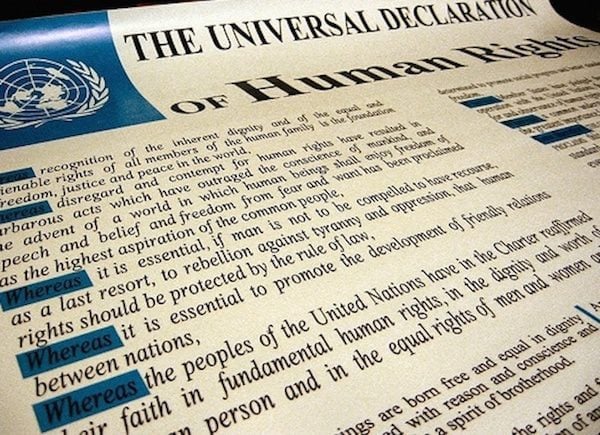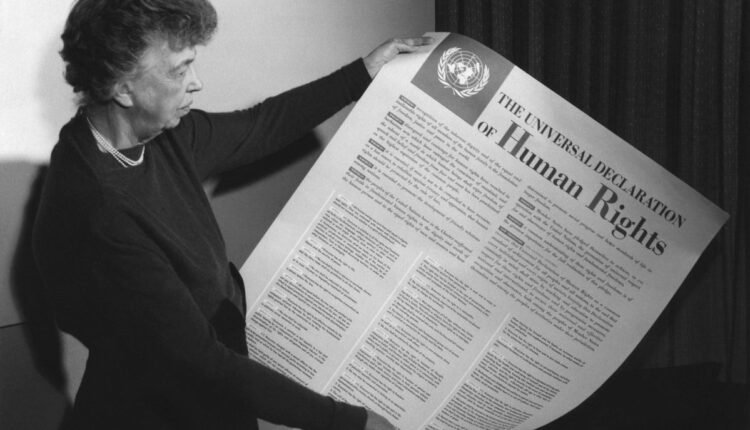Article 3 of the Universal Declaration of Human Rights states that everyone has the right to life, liberty, and security of person. This fundamental right emphasizes the value of human life and the importance of individual freedom and safety.
Upholding this article ensures that individuals are protected from arbitrary deprivation of their rights and can live without fear of harm or oppression. A society that respects and upholds Article 3 fosters an environment where every person can enjoy the full spectrum of their human rights.
This article serves as a reminder of the inherent dignity and worth of every individual and forms the cornerstone for building a just and inclusive society.
Discovering Your Guaranteed Human Rights
The Universal Declaration of Human Rights (UDHR) is an international document adopted by the United Nations General Assembly in 1948. It serves as a framework for the promotion and protection of human rights for all individuals, regardless of their race, religion, gender, or nationality.
Origins Of Universal Human Rights
The realization of universal human rights can be traced back to centuries of struggles and progress in various societies around the world. Influenced by Enlightenment ideas, the French Revolution played a significant role in advocating for the recognition of fundamental human rights. Later, the atrocities committed during World War II underscored the urgent need for a universal framework to ensure the dignity and well-being of every person.
Implications Of Human Rights In Daily Life
Human rights have far-reaching implications and are applicable to various aspects of daily life. They guarantee the right to life, liberty, and security of person, provide protection against discrimination, and ensure equal access to education, healthcare, and employment opportunities. These rights also uphold freedom of expression, association, and religion, allowing individuals to participate in the democratic processes of their society.
The principles of the UDHR have been enshrined in domestic laws and constitutions worldwide, serving as a reference for justice, equality, and fairness. However, the full realization of human rights remains a continuous effort, requiring vigilance and collective action to address violations and promote a society where the rights of all individuals are respected.

Credit: fanack.com
Key Articles Emphasizing Equality
Highlighting the importance of equality, these key articles focus on the Universal Declaration of Human Rights. These articles advocate for fair treatment and emphasize the fundamental rights of all individuals.
Equality And Non-discrimination Principles
The Universal Declaration of Human Rights (UDHR) includes several key articles that emphasize equality and non-discrimination as fundamental principles. Article 1 states that all human beings are born free and equal in dignity and rights. Article 2 prohibits discrimination on the grounds of race, color, sex, language, religion, political or other opinion, national or social origin, property, birth, or any other status.
Article 7 ensures equality before the law, while Article 26 asserts the right to education on the basis of equal opportunity. Article 23 declares the right to work without discrimination and with equal pay for equal work. Article 16 defends the right to marriage and establishes equality within marriage.
Overall, these articles of the UDHR provide a strong foundation for equal rights and non-discrimination, serving as a global standard for promoting equality and ensuring that all individuals are treated fairly and equally.
The Importance Of Freedom Of Expression
|
Article of the Universal Declaration of Human Rights Essence Of Freedom Of SpeechFreedom of expression is a fundamental right that allows individuals to express their thoughts, opinions, and ideas without fear of censorship or retribution. It is an essential component of a democratic society, fostering open dialogue and promoting the exchange of diverse perspectives. The essence of freedom of speech lies in its ability to challenge established norms, question authority, and bring about social change. By protecting the right to express oneself, societies enable the dissemination of information and the sharing of ideas. This not only facilitates the spread of knowledge but also promotes informed decision-making and democratic participation. Moreover, the ability to express one’s opinions and beliefs freely encourages intellectual growth, creativity, and innovation. Ensuring the protection of opinion and information sharing is crucial for maintaining a free and open society. It empowers individuals to voice their concerns, hold institutions accountable, and contributes to the development of a well-informed citizenry. Upholding freedom of expression is not only a legal obligation but a moral imperative that recognizes and respects the inherent dignity and worth of every individual. |
Right To Privacy And Family Life
The right to privacy and family life is a fundamental human right protected by the Universal Declaration of Human Rights. This right recognizes the importance of safeguarding private and family affairs, ensuring individuals have control over their personal information, and maintaining autonomy within their personal lives.
Safeguarding private and family affairs allows individuals to make decisions regarding their personal lives without interference from the government or outside entities. It provides a sense of security and freedom, allowing individuals to determine how much information they want to share and protect their personal identity.
The right to privacy and family life also has a significant impact on personal autonomy. It empowers individuals to make choices regarding their personal relationships, lifestyle, and family matters. This includes decisions such as starting a family, choosing a partner, and maintaining confidentiality in sensitive family matters.
Rights Ensuring Justice For Everyone
The Universal Declaration of Human Rights (UDHR) encompasses several articles that guarantee rights ensuring justice for everyone. One such article is the Presumption of Innocence in Legal Proceedings, which states that everyone is innocent until proven guilty in a fair and public trial. This principle is crucial in upholding the rights of individuals and protecting them from unjust persecution. It emphasizes the need for evidence-based judgments and prevents arbitrary detentions or convictions. Another vital aspect related to ensuring justice for all is the access to fair public hearings. This means that everyone has the right to a fair and impartial hearing, where they can present their case, challenge evidence, and be heard by an independent and impartial tribunal. These fundamental rights are essential for a just legal system and are integral to the UDHR’s mission of promoting and protecting human rights.
Cultural Rights And Freedoms
Cultural Rights and Freedoms
The Universal Declaration of Human Rights recognizes the importance of cultural rights and freedoms for every individual. These rights include the freedom to take part in cultural activities, to access and contribute to cultural heritage, and to benefit from scientific progress and its applications. Participation in the cultural community allows individuals to express their identities, share knowledge, and engage in creative pursuits. It fosters social cohesion and strengthens cultural diversity. Through participation, individuals can contribute to the preservation and development of their cultural heritage, ensuring its transmission to future generations. Moreover, benefits from scientific progress enable individuals to enjoy advancements in technology and access to information, enhancing their personal, educational, and professional development. These rights and freedoms are essential for individuals to fully realize their potential and lead fulfilling lives.
Economic, Social, And Cultural Entitlements
In Article 26 of the Universal Declaration of Human Rights, the Right to Education is recognized as a fundamental entitlement. Everyone has the right to access education, which should be free, at least in the elementary and fundamental stages. Education should be directed towards the full development of human potential and promote understanding, tolerance, and friendship among all nations. Furthermore, the right to work is also emphasized, stating that everyone has the right to work, to free choice of employment, to just and favorable conditions of work, and to protection against unemployment.
When it comes to economic, social, and cultural entitlements, the Universal Declaration of Human Rights further addresses the importance of standard living conditions for health and well-being. A high level of physical and mental well-being is recognized as a fundamental right, and governments are urged to take the necessary steps to ensure the right to a healthy environment, including access to clean water, sanitation, housing, and healthcare services. Additionally, the Declaration stresses the importance of cultural rights, including the freedom to participate in cultural life and enjoy the benefits of scientific progress and its applications.
Taking Action Against Human Rights Violation
The Universal Declaration of Human Rights is a crucial document that outlines the fundamental rights and freedoms to which all individuals are entitled. To ensure the protection of these rights, taking action against human rights violations is essential. Various mechanisms have been established to safeguard these rights.
| 1. Legal Frameworks: | A strong legal framework is crucial to protect human rights. Countries enact legislation and establish judicial systems to enforce these laws and hold perpetrators accountable. |
| 2. International Organizations: | International organizations, such as the United Nations and its agencies, actively work to promote and protect human rights globally. They conduct investigations, provide support to victims, and advocate for change. |
| 3. Human Rights Advocacy: | Individuals and organizations play a vital role in advocating for human rights. They raise awareness, engage in campaigns, and mobilize public opinion to address violations and promote positive change. |
| 4. Reporting Mechanisms: | Reporting mechanisms, such as human rights commissions and ombudsmen, allow victims to file complaints and seek redress for human rights violations. |
| 5. International Courts and Tribunals: | International courts and tribunals provide avenues for justice on a global scale, addressing serious human rights abuses and ensuring accountability for individuals and states responsible. |
Frequently Asked Questions For Article Of The Universal Declaration Of Human Rights
What Is The Purpose Of The Universal Declaration Of Human Rights?
The Universal Declaration of Human Rights is aimed at promoting and protecting the fundamental rights and freedoms of every individual worldwide.
How Many Articles Are Included In The Universal Declaration Of Human Rights?
The Universal Declaration of Human Rights consists of 30 articles that cover a wide range of fundamental rights and freedoms.
What Are Some Examples Of The Rights Protected By The Universal Declaration Of Human Rights?
Some examples of the rights protected by the Universal Declaration of Human Rights include the right to life, liberty, equality, freedom of speech, and freedom from torture.
Is The Universal Declaration Of Human Rights Legally Binding?
Although the Universal Declaration of Human Rights is not legally binding, it serves as a moral and political guide for countries to ensure the protection of human rights.
Can The Universal Declaration Of Human Rights Be Enforced?
While the Universal Declaration of Human Rights does not have direct enforcement mechanisms, it has influenced the development of international human rights law and holds significant moral authority.
Conclusion
In a world where the rights and dignity of individuals are constantly under threat, the Universal Declaration of Human Rights serves as a beacon of hope. The 30 articles encompass a wide range of fundamental rights, from the right to life and liberty to the right to education and a fair trial.
As we reflect on these principles, it becomes evident that the protection of human rights is essential for creating a just and harmonious society. Let us strive to uphold these rights for all, regardless of differences, and work towards a world where every individual can live with dignity and equality.
Importance Of Human Rights – Unlocking The Power



